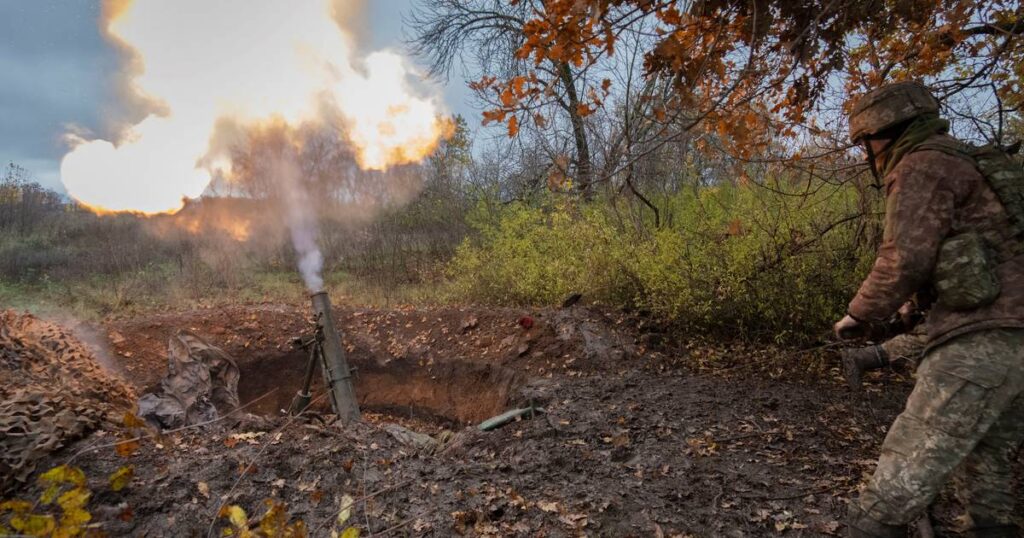On Thursday (local time), as fighting grew more intense in the east of the nation, Ukrainian forces launched an assault on Russia’s control of the southern city of Kherson. The conflicts erupted as news spread that the city’s Moscow-appointed leadership had left, joining the tens of thousands of citizens who had already gone to other Russian-controlled regions.
The Dnieper River, which divides the area and the nation, was being attacked by Ukrainian forces as they encircled Kherson from the west.
Vladimir Putin, the president of Russia, stated that Moscow has no plans to use nuclear weapons in Ukraine while the conflicts took place.
Putin remarked at a gathering of world specialists on foreign affairs, “We see no need for such.” That serves no purpose, either political or military.
The Russian leader also sought to cast the conflict as part of efforts by the West to secure global domination.
In a “dangerous and brutal” game of dominance, he charged that the US and its allies were seeking to impose their conditions on other countries.
Putin, who sent his troops into Ukraine on February 24, has described Western support for Ukraine as part of broad efforts by Washington and its allies to enforce what they call a rules-based world order that only foments chaos.
Russia has also threatened to attack Western commercial satellites that are being used for military operations in support of Ukraine, and a spokesperson for the foreign ministry has accused the United States of pushing for “thoughtless and insane” escalation.
Maria Zakharova, a spokeswoman for the White House, said that Washington should adopt a strategy more in line with that of the 1962 Cuban Missile Crisis, when the Cold War giants pulled back from a potential nuclear exchange.
“The more the US is drawn into supporting the Kyiv regime on the battlefield, the more they risk provoking a direct military confrontation between the biggest nuclear powers fraught with catastrophic consequences,” Zakharova said.
An offensive by Ukraine to retake the Kherson region and its city, which Russian forces had taken during the early days of the conflict, which is now in its ninth month, is moving forward.
According to Vladimir Saldo, the region’s newly-installed governor appointed by the Kremlin, more than 70,000 people have left the Kherson city area in recent days (local time).
The deputy governor, Kirill Stremousov, said that members of the regional administration, which was supported by Russia, also fled. Monuments to Russian heroes were moved, along with the remains of Grigory Potemkin, the Russian general who founded Kherson in the 18th century. His bones were kept at St. Catherine’s Church in the city.
Volodymyr Zelensky, the president of Ukraine, referred to rumours that Russian soldiers could leave the city as false information.
According to Zelensky, “I don’t see them running from Kherson,” he stated in an interview with the Italian newspaper Corriere della Sera. “This is an informational offensive to get us to send soldiers there from other risky areas.
Zelensky also referred to recent efforts by local Kremlin-backed officials to get the civilian population of the city to evacuate further into Russian-held territory prior to the Ukrainian advance as “theatre.”
Russian soldiers continued to strike Ukraine’s energy infrastructure throughout the month, which has raised concerns as winter approaches.
According to Oleksiy Kuleba, the regional governor of Kyiv, a Russian drone attack caused a fire at an energy facility close to the Ukrainian capital.
He claimed that the most recent strikes caused “extremely substantial harm.”
In televised statements, Kuleba said that “the Russians are employing drones and missiles to damage Ukraine’s electricity grid ahead of the winter and terrorise civilians.”
New rolling blackouts were declared by Kuleba, who also advised people to save energy. He said authorities were still pondering how to restore power.
Rolling blackouts would also be implemented in the nearby Chernihiv, Cherkasy, and Zhytomyr areas, according to Kyrylo Tymoshenko, deputy head of the presidential office of Ukraine.
Zelensky claimed that 30% of the nation’s energy infrastructure had already been destroyed as a result of Russian attacks.
A power station outside Sevastopol, a port in the Russian-occupied territory of Crimea, was destroyed, probably in retaliation for Russian strikes on Ukrainian infrastructure.
The plant suffered minor damage in a drone attack, according to city leader Mikhail Razvozhayev. He said that the electricity was never cut off.
Ukraine attacks Russia’s control over the city of Kherson in the south

